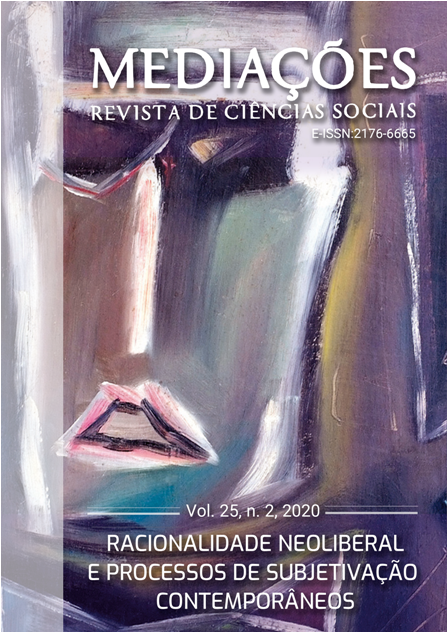Neoliberalism and psychic suffering: the psychiatrisation of school suffering
DOI:
https://doi.org/10.5433/2176-6665.2020v25n2p302Keywords:
Human capital, Education, Psychic suffering, Psychiatrization, ChildhoodAbstract
Neoliberalism is a space of production of subjectivity whose axis is the notion of human capital. Considering that, for the neoliberal discourse, the construction of this human capital must begin in early childhood, we show that, in this context, education is understood as an investment destined to hierarchize and value this capital. Starting from the works of Dardot and Laval, we propose to study the effective impact that this neoliberal way of understanding education has in the school environment, underlining its link with the proliferation of psychiatric diagnoses in childhood. Finally, we analyze how this process of psychiatrisation of psychic suffering, and of erasing social factors and conflicts, impacts on the mental health of children when they fail in the educational process.Downloads
References
APA - AMERICAN PSYCHIATRIC ASSOCIATION. Diagnostic and Statistical Manual of Mental Disorders, DSM-5. Arlington: APA, 2013.
BALL, Stephen J. Educação global S. A.: novas redes políticas e o imaginário neoliberal. Ponta Grossa: UEPG, 2014.
BAUMAN, Zygmunt. Miedo líquido: la sociedad contemporánea y sus temores. Buenos Aires: Paidos, 2007.
BECKER, Gary. Investment in human capital: a theoretical analysis. The Journal of Political Economy, Chicago, v. LXX, n. 5, p. 9-49, out. 1962.
BOURDIEU, Pierre. A essência do neoliberalismo. Le Monde Diplomatique, São Paulo, p. 10-13 , fev. 1998.
BOURDIEU, Pierre. Capital cultural, escuela y espacio social. Buenos Aires: Siglo XXI, 2008.
CAMPBELL, Denis; MARSH, Sarah. Quarter of a million children receiving mental health care in England. The Guardian, New York, 3 Oct. 2016. Disponível em: https://www.theguardian.com/society/2016/oct/03/quarter-of-a-million-children-receiving-mental-health-care-in-england. Acesso em: 13 jun. 2020.
CARVALHO, José Sérgio Fonseca. Educação, uma herança sem testamento: diálogos com o pensamento de Hannah Arendt. São Paulo: FAPESP, 2017.
DARDOT, Pierre; LAVAL, Christian. A nova razão do mundo: ensaio sobre a sociedade neoliberal. São Paulo: Boitempo, 2016.
DARÉ, Patricia K. A definição das políticas públicas educacionais brasileiras a partir do discurso neoliberal. Tese de doutorado, Ciências Humanas, Universidade Federal de Santa Catarina, 2019.
FARIAS, Francisco Ramos. O fracasso escolar no cenário das patologias da contemporaneidade. Arquivos Brasileiros de Psicologia, Rio de Janeiro, v. 59, n. 2, dez. 2007.
FOUCAULT, Michel. Naissance de la biopolitique. Paris: Gallimard, 2005.
FOUCAULT, Michel. Vigiar e punir. Petropolis: Ed. Vozes, 1999.
GOFFMAN, Ervin. Estigma: notas sobre a manipulação da identidade deteriorada. Rio de janeiro: LTC, 1988.
INSEL, Thomas. Transforming diagnosis. NIMH Director'sbBlog, 29 Apr. 2013. Disponível em: http://www.nimh.nih.gov/about/director/2013/transforming-diagnosis.shtml. Acesso em: 13 jun. 2020.
LAVAL, Christan. A escola não é uma empresa: o neoliberalismo em ataque no ensino público. Londrina: Planta, 2004.
LAVAL, Christian. Foucault, Bourdieu et la question néolibéral. Paris: La Découvert, 2018.
LAVAL, Christian; BLAY, Michel. Neuropédagogie: le cerveau au centre de l'école. Paris: Tschann & Cie, 2019.
LAVAL, Christian; DARDOT, Pierre. Común: ensayo sobre la revolución en el siglo XXI. Barcelona: Gedisa Editorial, 2015.
MONCRIEFF, Joanna. Magic bullets for mental disorders: the emergence of the concept of an "antipsychotic" drug. Journal of the History of the Neurosciences, London, v. 22, n. 1, p. 30-46, 2013.
MONCRIEFF, Joanna. Neoliberalism and biopsychiatry: a marriage of convenience. In: COHEN, C.; TIMIMI, S. (ed.). Liberatory psychiatry: philosophy, politics and mental health. Cambridge: Cambridge University Press, 2008. p. 235-256. Disponível em: https://www.cambridge.org/core/books/liberatory-psychiatry/neoliberalism-and-biopsychiatry-a-marriage-of-convenience/73EDE3E8FF1797F891BDF1FC36C2A739. Acesso em: 13 jun. 2020.
OECD - ORGANIZAÇÃO PARA COOPERAÇÃO E DESENVOLVIMENTO ECONÔMICO. Lessons from PISA for Korea. Paris: OECD, 2014. Disponível em: http://dx.doi.org/10.1787/9789264190672-en. Acesso em: 13 jun. 2020.
PATTO, Maria Helena Souza. A produção do fracasso escolar: histórias de submissão e rebeldia. São Paulo: Intermeios, 2015.
PIGNARRE, Phyllipe. Les malheurs des psys: psychotropes et médicalisation du social. Paris: La Découverte, 2006.
ROSE, Nikolas. Our psychiatric future. Cambridge: Polity Press, 2019.
SCHULTZ, Theodor W. O capital humano: investimentos em educação e pesquisa. Rio de Janeiro: Zahar Editores, 1973.
SENNETT, Richard. A corrosão do caráter: o desaparecimento das virtudes com o novo capitalismo. Rio de Janeiro: BestBolso, 2012.
SOUZA, Aracy Mendes. Arqueologia do fracasso escolar nas práticas discursivas relativas ao ensino fundamental em Mato Grosso do Sul. 2011. Tese (Doutorado em Educação) - Universidade Federal do Mato Grosso do Sul, 2011.
VARSAVSKY, Julián. Parasite no es fantasía. Página 12, Buenos Aires, 27 fev. 2020.
WHITAKER, Robert. Anatomia de uma epidemia: medicamentos psiquiátricos y el asombroso aumento de las enfermedades mentales. Madrid: Capitan Swing, 2015.
WHITAKER, Robert. Mad in America: bad science, bad medecine, and the enduring mistratment of the mentallu ill. New York: Basic Books, 2010.
WHITAKER, Robert; COSGROVE, Lisa. Psychiatry under the influence: institutional corruption, social injury, and prescriptions for reform. Chennal: Palgrave MacMillan, 2015.
YOUNG MIND. 2020. Disponível em: https://youngminds.org.uk/. Acesso em: 13 jun. 2020
Downloads
Published
How to Cite
Issue
Section
License
Copyright (c) 2020 Sandra Caponi, Patricia Kozuchovski Daré

This work is licensed under a Creative Commons Attribution 4.0 International License.
Copyright on articles published in Mediações belongs to the author(s): in the case of partial or entire republication of the original publication, we ask author(s) to indicate the original publication in the periodical.
Mediações uses the Creative Commons Attribution 4.0 International license, which allows Open Access, enabling any user to read, download, copy and disseminate its content so long as adequately referenced.
The opinions expressed by the author(s) are their sole responsibility.
































